Demolition Contractors Edmonton
Find Demolition Contractors in Edmonton
Receive 3 FREE Demo Contractor quotes for your project today! Compare profiles, reviews, accreditations, portfolio, etc... and choose the best service.
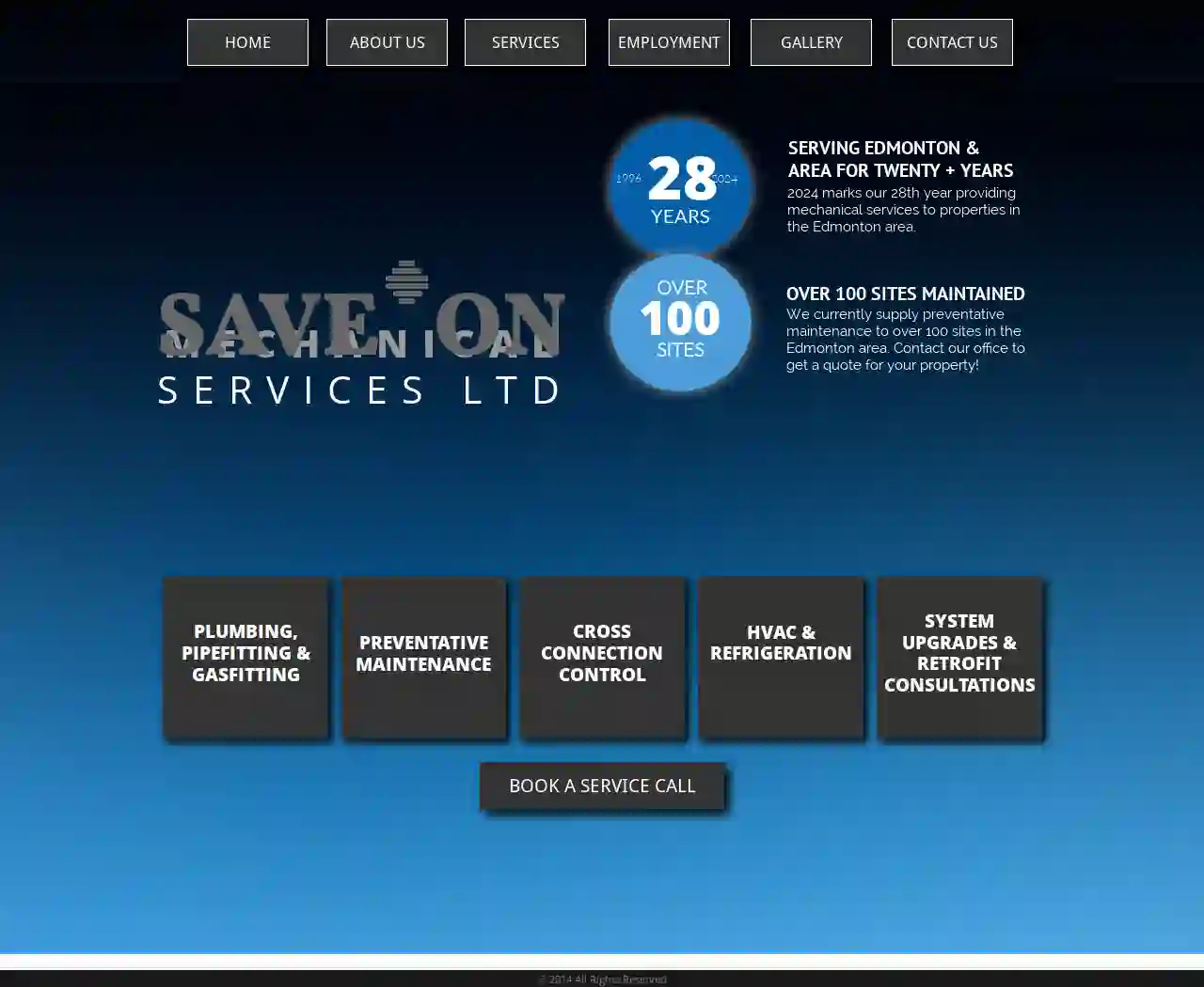
Save-On Mechanical Services
3.817 reviews123 Main Street, CITY, N0N 0N0, GBAbout SaveMech SaveMech is a leading provider of automotive repair and maintenance services in [CITY]. We are committed to providing our customers with the highest quality service at competitive prices. Our team of experienced technicians is dedicated to ensuring that your vehicle is repaired to the highest standards. We use only the best parts and equipment to ensure that your vehicle is running smoothly and safely. We also offer a wide range of services to meet your needs, including: Oil changes Brake repairs Tire services Engine repairs Transmission repairs And much more! We are committed to providing our customers with a positive experience. We offer a free shuttle service to and from our shop, and we are open late to accommodate your busy schedule. We also offer a 12-month/12,000 km warranty on all of our repairs. We are proud to be a part of the [CITY] community and we are committed to providing our customers with the best possible service.
- Services
- Why Us?
Get Quote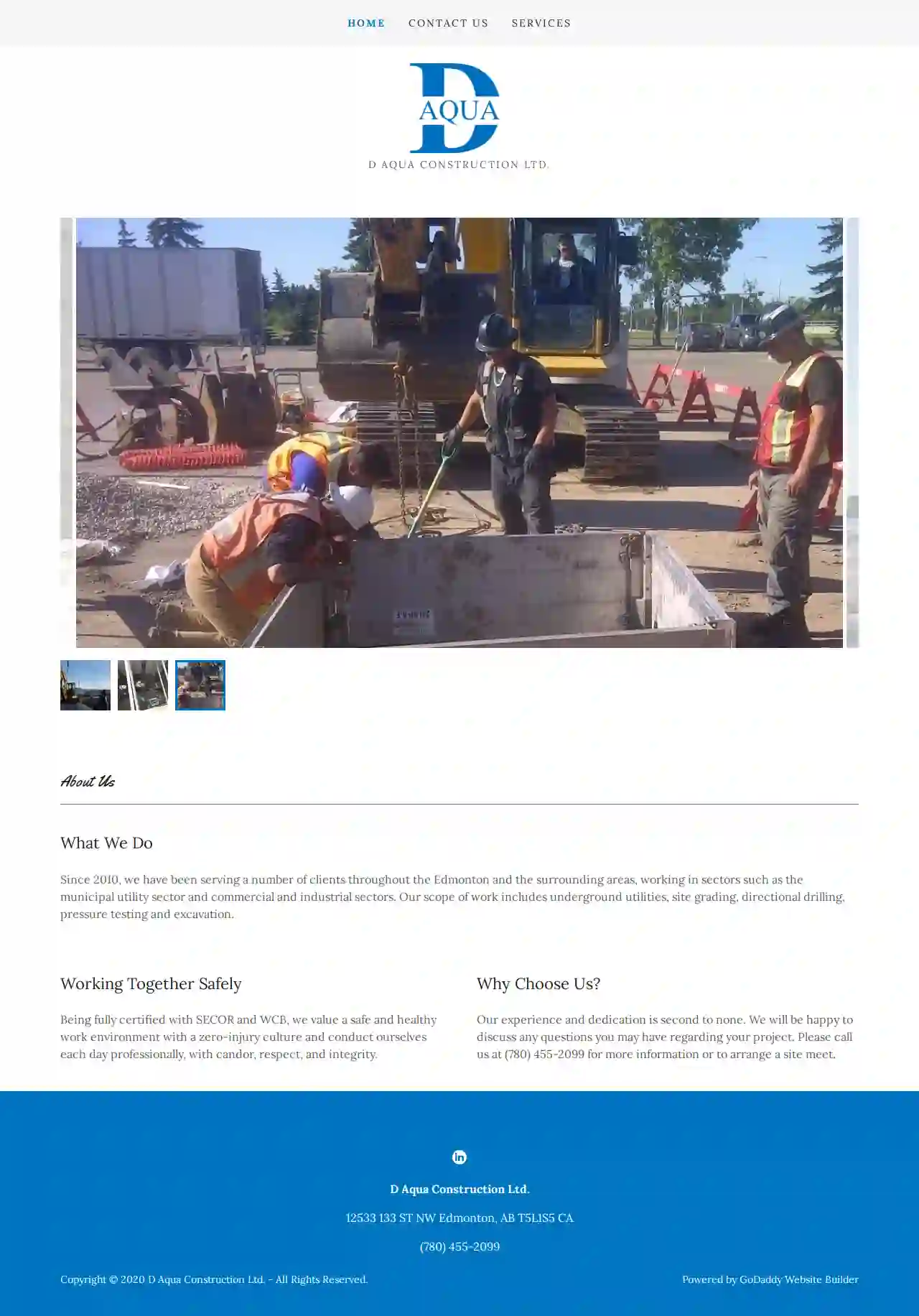
D AQUA Construction LTD
51 reviews12533 133 ST NW, Edmonton, T5L1S5, GBAbout Us Since 2010, D Aqua Construction Ltd. has been serving a number of clients throughout the Edmonton and surrounding areas, working in sectors such as the municipal utility sector and commercial and industrial sectors. Our scope of work includes underground utilities, site grading, directional drilling, pressure testing and excavation. Working Together Safely Being fully certified with SECOR and WCB, we value a safe and healthy work environment with a zero-injury culture and conduct ourselves each day professionally, with candor, respect, and integrity. Why Choose Us? Our experience and dedication is second to none. We will be happy to discuss any questions you may have regarding your project. Please call us at (780) 455-2099 for more information or to arrange a site meet.
- Services
- Why Us?
- Gallery
Get Quote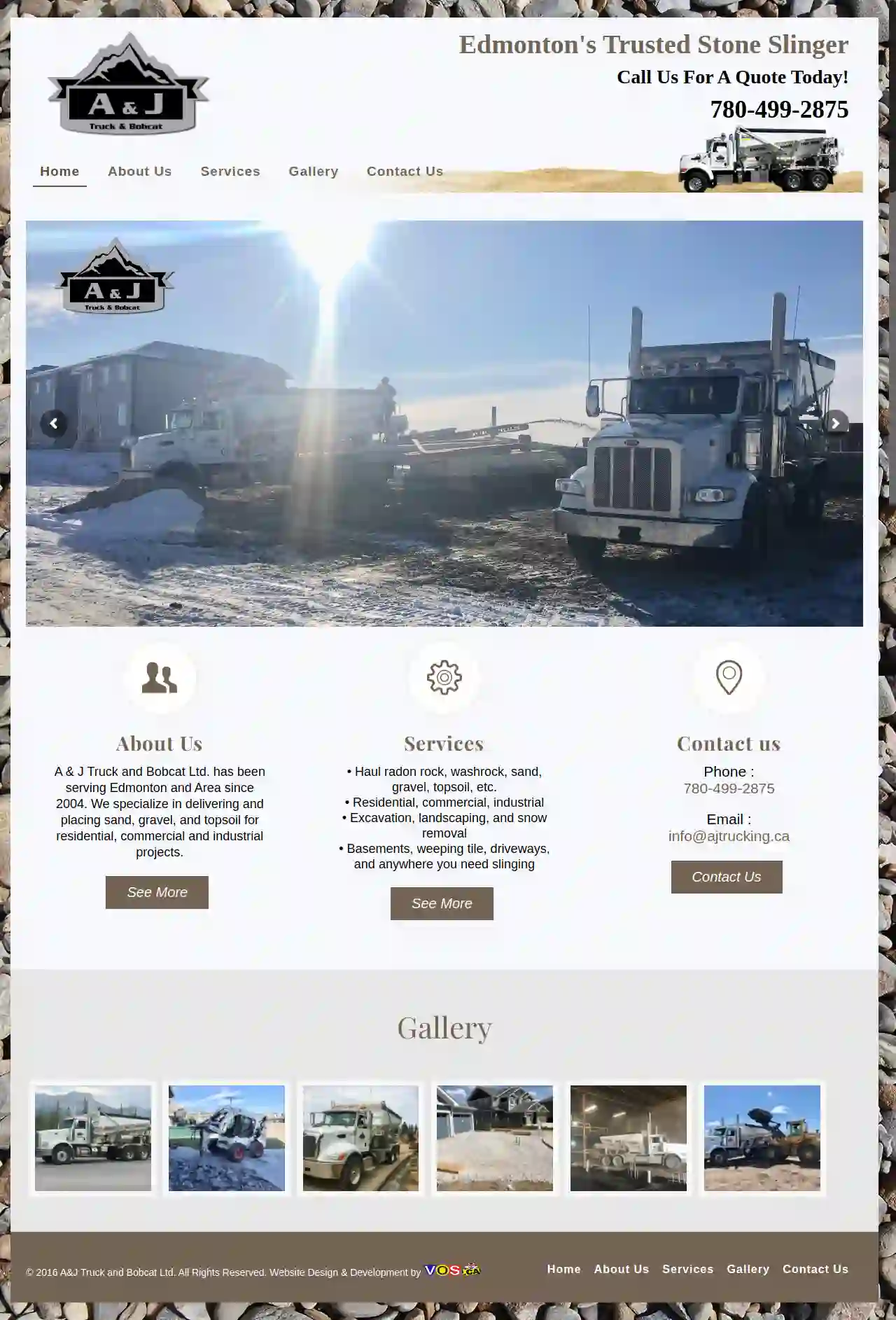
A & J Truck and Bobcat Ltd. | Edmonton Slinger Services
53 reviewsEdmonton, GBAbout A&J Truck and Bobcat Ltd. A&J Truck and Bobcat Ltd. has been serving Edmonton and the surrounding region since 2004. We specialize in delivering and placing aggregates such as washrock, sand, and gravel for residential, commercial, and industrial projects. We use multicat technology to place your aggregates in minutes, eliminating the need for workers and increasing job site efficiency. Our fleet of stone slingers, dump trucks, and skid steers offer solutions for all stages of a construction project. We also provide a range of excavation, landscaping, and snow removal services catered to your needs. Our company meets all requirements for safety, insurance, and liability to ensure you and your company are protected. We offer quality service at a reasonable price and strive to provide client satisfaction.
- Services
- Why Us?
- Gallery
Get Quote
Wolf Excavating
11 reviews123 Main Street, [CITY], 12345, GBAbout Wolf Excavating Wolf Excavating is a family-owned and operated business serving the [CITY] area for over 20 years. We are committed to providing our clients with high-quality excavation services at competitive prices. Our team of experienced professionals is dedicated to delivering exceptional results on every project, no matter how big or small. We understand that excavation projects can be complex and require careful planning and execution. That's why we take a collaborative approach with our clients, working closely with them to ensure their needs are met and their expectations are exceeded. At Wolf Excavating, we are proud of our reputation for reliability, professionalism, and customer satisfaction. We are committed to safety and environmental responsibility, and we always strive to minimize disruption to our clients' properties.
- Services
- Why Us?
- Testimonials
Get Quote
Extreme Concrete Cutting & Coring Ltd.
3.86 reviews40 Capilano Way, New Westminster, V3L 5H2, GBExtreme Concrete Cutting: Industry Leaders in Concrete Cutting and Coring Since 1976 Extreme Concrete Cutting is a leading provider of concrete cutting and coring services in Western Canada. We have been serving the needs of our clients for over 45 years, and we have a proven track record of delivering high-quality, reliable services. We are committed to providing our clients with the best possible service, and we are always striving to improve our processes and technologies. We are proud to be a leader in the industry, and we are committed to providing our clients with the best possible experience. We offer a wide range of services, including: Wire sawing Core drilling Wall sawing Slab sawing Excavating, breaking & demolition Robotic demolition Concrete placing & finishing GPR & digital X-ray We have a team of experienced and qualified professionals who are dedicated to providing our clients with the best possible service. We are committed to safety, and we have a strict safety program in place to ensure that all of our work is done safely and efficiently. We are also committed to environmental responsibility, and we use environmentally friendly practices whenever possible. We are proud to be a part of the community, and we are committed to giving back. We support a number of local charities and organizations, and we are always looking for ways to make a positive impact on our community.
- Services
- Why Us?
- Gallery
Get Quote
Graham Construction & Engineering Inc
3.930 reviews10840 27 Street SE, Calgary, T2Z 3R6, GBYour Construction Solutions Partner Graham Construction is an employee-owned construction solutions partner with revenues exceeding $4 billion annually. With over nine decades of experience, and offices throughout North America, we deliver lasting value through projects that enable people and communities to live, work, move and grow in a rapidly changing world. What we Care About Purpose, Values & Culture are at the Heart of Graham Deeply embedded in our company since its founding, Graham’s values and culture can be summed up by three words: commitment, integrity and reliability. They create concrete business ethics that strengthen our ability to deliver value to our clients. The interests of our clients are paramount. As an employee-owned company, we firmly believe our success depends on delivering the highest level of quality and service.
- Services
- Why Us?
- Gallery
Get Quote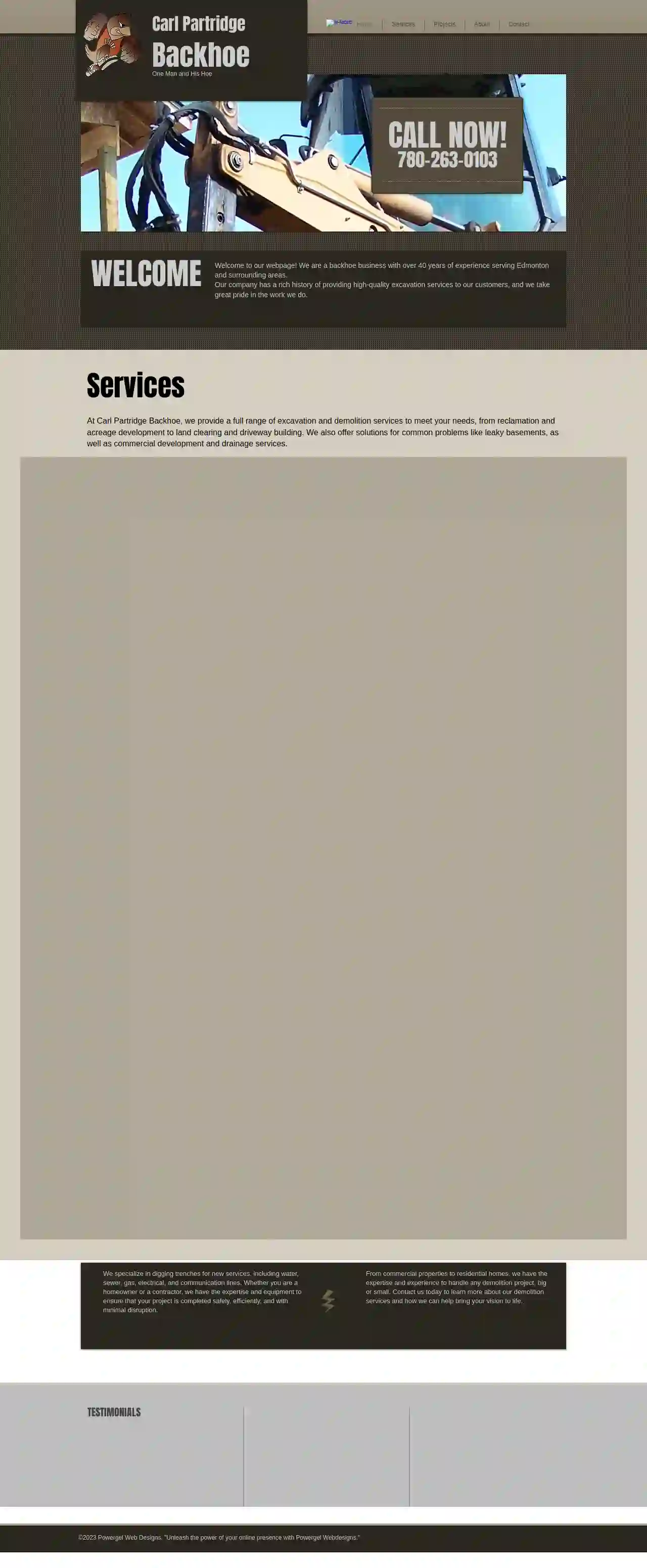
Partridge Backhoe
1Edmonton, GBWELCOME Welcome to our webpage! We are a backhoe business with over 40 years of experience serving Edmonton and surrounding areas. Our company has a rich history of providing high-quality excavation services to our customers, and we take great pride in the work we do.
- Services
- Why Us?
- Gallery
Get Quote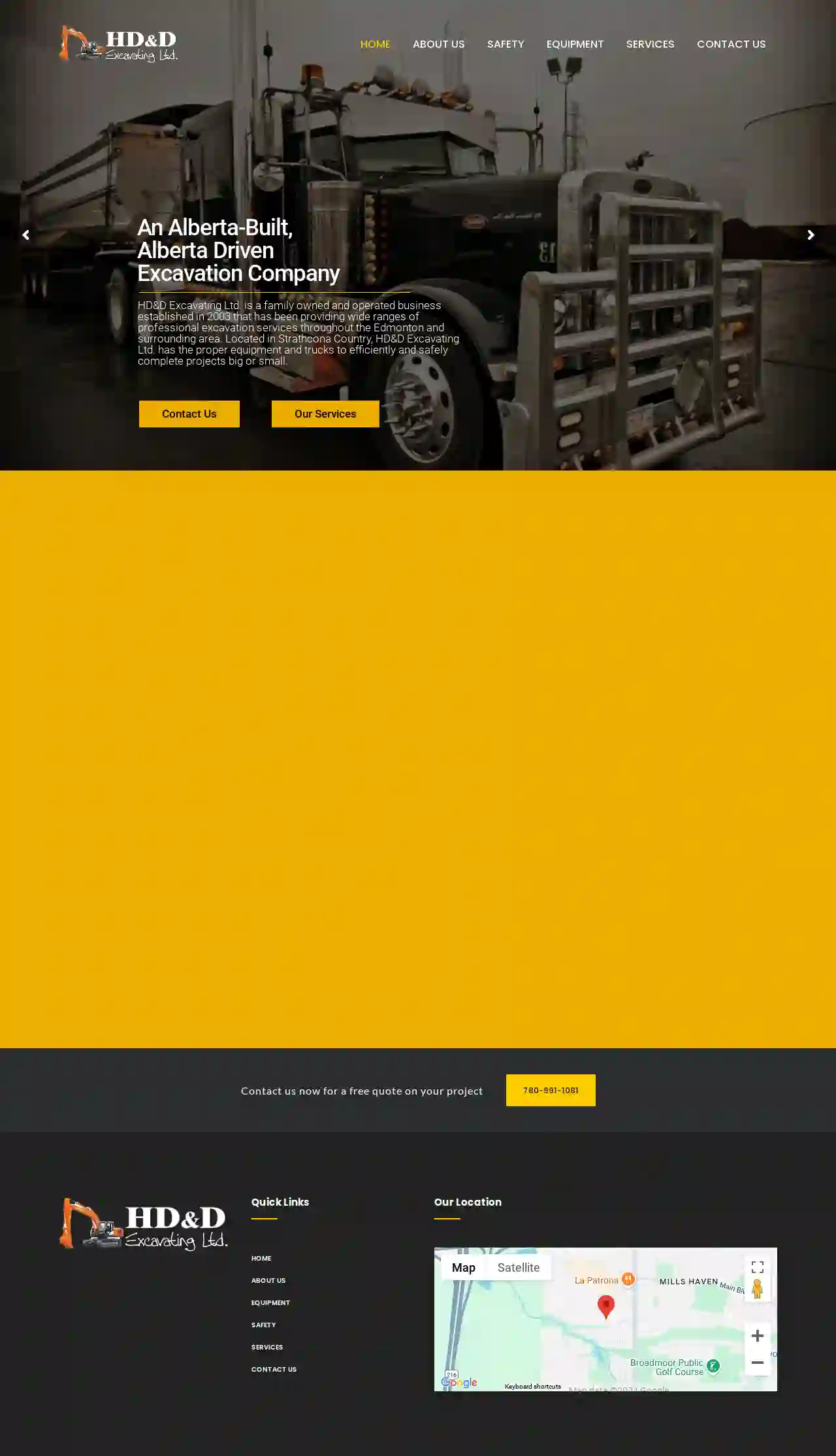
HD&D Excavating
4.910 reviews397, 52458 RR# 223, Sherwood Park, AB, T8A5V1, GBHD&D Excavating Ltd. - Your Trusted Excavation Partner in Alberta HD&D Excavating Ltd. is a family-owned and operated business established in 2003. We've been proudly serving the Edmonton area and surrounding communities with a wide range of professional excavation and trucking services. Based in Strathcona County, we have the right equipment and trucks to handle projects of all sizes, ensuring efficiency and safety every step of the way. From residential basement excavations to emergency spill cleanups, we offer a comprehensive range of services. We're committed to providing exceptional service and exceeding our clients' expectations. Our team is dedicated to delivering high-quality work, on time and within budget. We understand the importance of clear communication and collaboration throughout every project. Contact us today for a free quote and let us help you bring your vision to life.
- Services
- Why Us?
- Gallery
Get Quote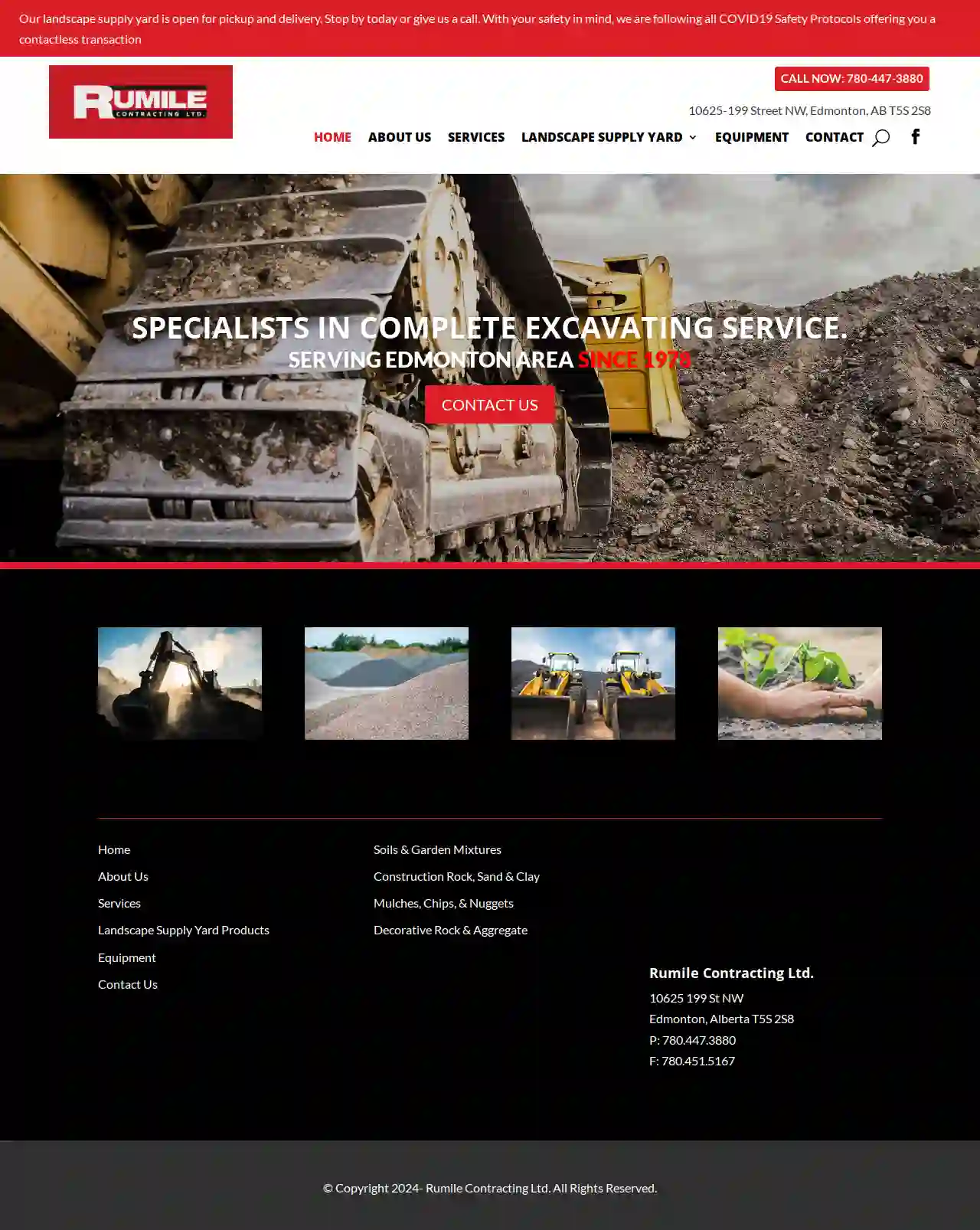
Rumile Contracting Ltd
4.517 reviews10625 199 St NW, Edmonton, T5S 2S8, GBRumile Contracting Ltd. Rumile Contracting Ltd. is a family-owned and operated business serving the Edmonton area since 1978. We specialize in complete excavating services, and we are committed to providing our clients with the highest quality workmanship and customer service. We are proud to be a trusted name in the Edmonton community, and we are dedicated to providing our clients with the best possible experience. Our Services We offer a wide range of excavating services, including: Site preparation Grading Demolition Utilities Drainage And more! Our Commitment to Quality We are committed to providing our clients with the highest quality workmanship and customer service. We use only the best equipment and materials, and we are always striving to improve our processes. We are also committed to safety, and we take all necessary precautions to ensure the safety of our employees and the public. Contact Us Today If you are looking for a reliable and experienced excavating contractor, please contact us today. We would be happy to discuss your project and provide you with a free estimate.
- Services
- Why Us?
- Gallery
Get Quote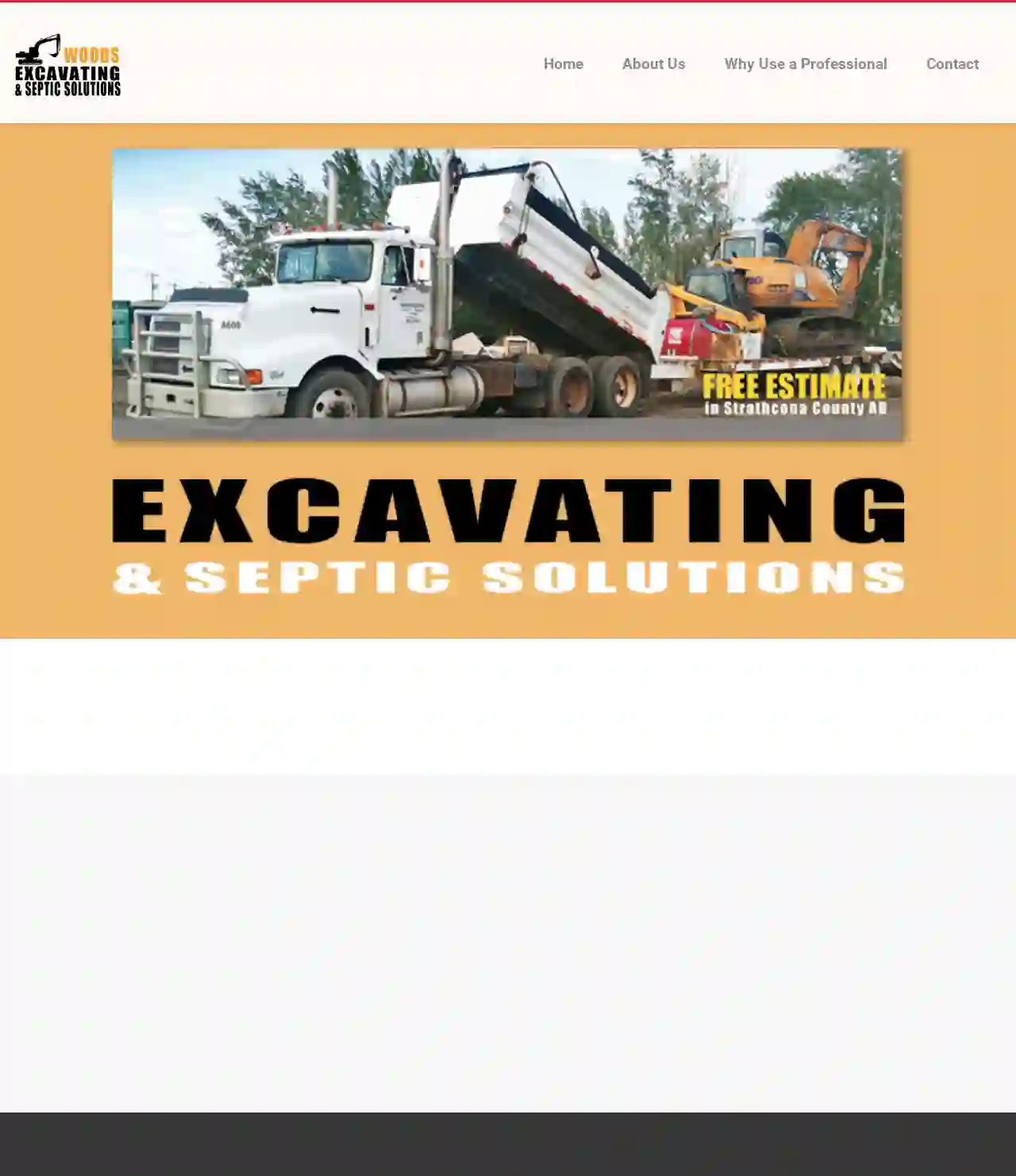
Woods Excavating
1Edmonton, GBWoods Excavating: Your Trusted Partner for Excavation and Site Preparation in Strathcona County Woods Excavating is a reputable company specializing in excavation and site preparation services in Strathcona County, Alberta. We are committed to providing high-quality, reliable services to our clients, ensuring their projects are completed on time and within budget. Our team of experienced professionals utilizes state-of-the-art equipment to handle a wide range of projects, from demolition and utility work to site grading and drainage solutions. We understand the importance of safety and efficiency in every project. Our team is fully insured and adheres to the highest industry standards, ensuring a safe and productive work environment. We are dedicated to exceeding client expectations and building lasting relationships based on trust and transparency. Whether you're a homeowner, builder, or developer, Woods Excavating is your one-stop shop for all your excavation and site preparation needs. Contact us today for a free estimate and let us help you bring your project to life.
- Services
- Why Us?
- Gallery
Get Quote
Over 11,537+ Excavation Businesses in our network
Our excavation contractors operate in Edmonton & surrounding areas!
ExcavationHQ has curated and vetted the Best Excavation Businesses arround Edmonton. Find a top & trustworthy contractor today.
Frequently Asked Questions About Demolition Contractors
- Dust Suppression: Use water spraying, misting systems, or other dust suppression techniques to control airborne particles.
- Noise Barriers: Erect temporary noise barriers around the demolition site to reduce noise transmission to nearby properties.
- Work Schedule: Schedule noisy demolition activities during permitted hours to minimize disturbance to neighbors.
- Communication: Keep neighbors informed about the demolition schedule and any potential disruptions.
- Implosion: Using explosives to collapse a structure inwards rapidly. Suitable for large buildings in open areas.
- Wrecking Ball: Swinging a large steel ball to impact and break down the structure. Effective for bringing down walls and other solid elements.
- High-Reach Demolition: Utilizing specialized excavators with extended arms and demolition attachments for dismantling tall structures piece by piece.
- Selective Demolition: Removing specific parts of a building while preserving other sections. Often used in renovation projects.
- Deconstruction: Carefully dismantling a building to salvage reusable materials, reducing waste and environmental impact.
- Feasibility Studies: Assessing the viability and challenges of a demolition project.
- Demolition Planning: Developing demolition plans, including method selection, sequencing, and safety procedures.
- Permitting Assistance: Navigating the demolition permitting process and ensuring compliance with regulations.
- Hazardous Material Surveys: Identifying and managing hazardous materials, such as asbestos and lead paint.
- Cost Estimating: Providing accurate cost estimates for demolition services.
- Project Management: Overseeing the demolition process and ensuring it proceeds as planned.
- 'Can I see proof of your licensing and insurance?' Verify their credentials and coverage.
- 'What experience do you have with projects like mine?' Ensure they have relevant expertise.
- 'Can you provide references from past clients?' Check their reputation and customer satisfaction.
- 'What are your safety protocols?' Prioritize contractors who emphasize safety.
- 'How will you handle hazardous materials?' Ensure they have proper procedures for asbestos or lead abatement.
- 'What is your timeline for completing the project?' Understand the project duration.
- 'How will you manage noise, dust, and debris?' Discuss mitigation measures for minimizing disruption.
- 'What are your payment terms?' Clarify payment schedules and any required deposits.
How can I minimize the dust and noise from demolition?
What are the different types of demolition?
What is the role of a demolition consultant?
What questions should I ask a demolition contractor before hiring them?
How can I minimize the dust and noise from demolition?
- Dust Suppression: Use water spraying, misting systems, or other dust suppression techniques to control airborne particles.
- Noise Barriers: Erect temporary noise barriers around the demolition site to reduce noise transmission to nearby properties.
- Work Schedule: Schedule noisy demolition activities during permitted hours to minimize disturbance to neighbors.
- Communication: Keep neighbors informed about the demolition schedule and any potential disruptions.
What are the different types of demolition?
- Implosion: Using explosives to collapse a structure inwards rapidly. Suitable for large buildings in open areas.
- Wrecking Ball: Swinging a large steel ball to impact and break down the structure. Effective for bringing down walls and other solid elements.
- High-Reach Demolition: Utilizing specialized excavators with extended arms and demolition attachments for dismantling tall structures piece by piece.
- Selective Demolition: Removing specific parts of a building while preserving other sections. Often used in renovation projects.
- Deconstruction: Carefully dismantling a building to salvage reusable materials, reducing waste and environmental impact.
What is the role of a demolition consultant?
- Feasibility Studies: Assessing the viability and challenges of a demolition project.
- Demolition Planning: Developing demolition plans, including method selection, sequencing, and safety procedures.
- Permitting Assistance: Navigating the demolition permitting process and ensuring compliance with regulations.
- Hazardous Material Surveys: Identifying and managing hazardous materials, such as asbestos and lead paint.
- Cost Estimating: Providing accurate cost estimates for demolition services.
- Project Management: Overseeing the demolition process and ensuring it proceeds as planned.
What questions should I ask a demolition contractor before hiring them?
- 'Can I see proof of your licensing and insurance?' Verify their credentials and coverage.
- 'What experience do you have with projects like mine?' Ensure they have relevant expertise.
- 'Can you provide references from past clients?' Check their reputation and customer satisfaction.
- 'What are your safety protocols?' Prioritize contractors who emphasize safety.
- 'How will you handle hazardous materials?' Ensure they have proper procedures for asbestos or lead abatement.
- 'What is your timeline for completing the project?' Understand the project duration.
- 'How will you manage noise, dust, and debris?' Discuss mitigation measures for minimizing disruption.
- 'What are your payment terms?' Clarify payment schedules and any required deposits.